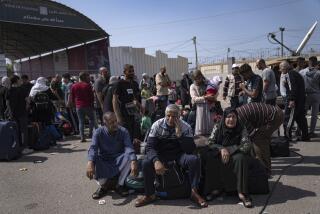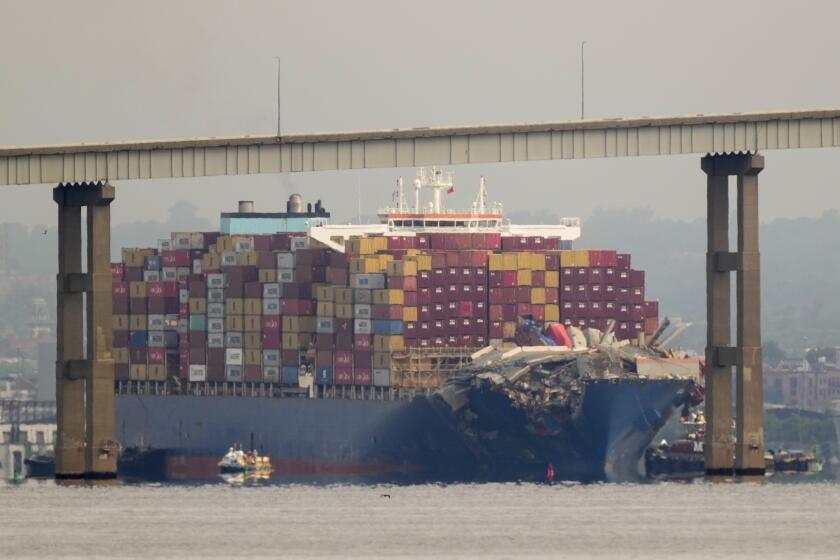Bosnia Arrests Ignite Wave of Support
Last week’s raids against two war crimes suspects by British forces in Bosnia have generated an upsurge in support for similar actions against others accused of atrocities in the Balkans.
The two carefully planned missions have been judged a success in political circles. The British troops, with U.S. support, captured one Bosnian Serb warlord from the town of Prijedor and killed another who resisted arrest--with forces suffering only one minor casualty in the process.
Tuesday, there were more calls for action.
Former Republican presidential candidate Bob Dole and Sen. Joseph I. Lieberman (D-Conn.) issued a bipartisan appeal to President Clinton to go after Bosnia-Herzegovina’s war crimes suspects even if it entails risks.
“How do we tell people elsewhere the difference between right and wrong if we don’t know the difference ourselves?” Dole asked.
Dole later shifted from a moral to a pragmatic argument, rejecting the idea that the risks of any such operations are simply too great.
“Not going after them risks an investment of $7 billion, the commitment of thousands of military personnel and the prestige of the world’s strongest country,” he said. “More importantly, we won’t have peace in Bosnia.”
Lieberman referred to former Bosnian Serb leader Radovan Karadzic as “a practical obstacle to the implementation” of the 1995 Dayton, Ohio, peace accords. Karadzic’s arrest is essential if peace is to have a chance in Bosnia, he said. “We must take the next step.”
Both comments reflect assessments that Karadzic, a strident opponent of the Dayton agreements, continues to wield significant political power among Bosnian Serbs from his stronghold near Sarajevo and that his arrest is as much a political concern as it is a moral question.
Although both Dole and Lieberman previously have called for the arrest of war crimes suspects, the timing and tone of their remarks Tuesday, coupled with Dole’s willingness to accept an element of risk, constitute important support for tougher action, analysts here believe.
The two men’s remarks came as a Washington-based technical support group for the war crimes tribunal in The Hague issued an open letter to Clinton signed by more than 80 church, labor and human rights groups. The letter demanded the arrest of war crimes suspects.
Bosnia’s fragile peace is likely to deteriorate quickly if U.S. troops pull out as promised next June and “leave behind a country in which persons indicted for war crimes continue to wield significant power and make a mockery of the rule of law,” said the letter, produced by the Coalition for International Justice.
The coalition’s executive director, John Hefferman, said he believes that last week’s operation will add to the initiative’s impact.
Of the 78 men publicly indicted for war crimes stemming from the brutal four-year Balkan war, only 10 are in custody; two have died. The majority of those still free are Bosnian Serbs.
Even Clinton’s own rhetoric also seemed to stiffen Tuesday, warning that any retaliation against the NATO-led peace stabilization force for last week’s raids would be a “grave mistake.”
The British operation and the U.S. reaction to it come as the Clinton administration has set a higher priority on the issue of war crimes suspects, concluding that their capture is necessary for carrying out the Dayton accords and for withdrawal next year of the 8,000 American troops stationed there.
These factors have eased the memory of how U.S. military leaders serving as part of a United Nations peacekeeping mission let themselves get sucked into a futile manhunt for Somalia’s premier warlord, Mohammed Farah Aidid, nearly four years ago. The operation left 18 American soldiers dead and U.S. commanders humiliated.
More than any other factor, fears of a second Somalia have dampened U.S. enthusiasm to go after Bosnia’s accused war criminals. In military circles this week, there were signs that caution remained.
While senior military officials, who have been most acutely aware of the risks posed by manhunts, have in recent days hinted that they might be receptive to aggressive action by the NATO-led force in Bosnia, caution remains top priority among the uniforms. Senior Clinton administration officials also say it would be wrong to assume that if the British captured one suspect, a move against Karadzic is imminent.
Times staff writer Paul Richter contributed to this report.
More to Read
Start your day right
Sign up for Essential California for news, features and recommendations from the L.A. Times and beyond in your inbox six days a week.
You may occasionally receive promotional content from the Los Angeles Times.






